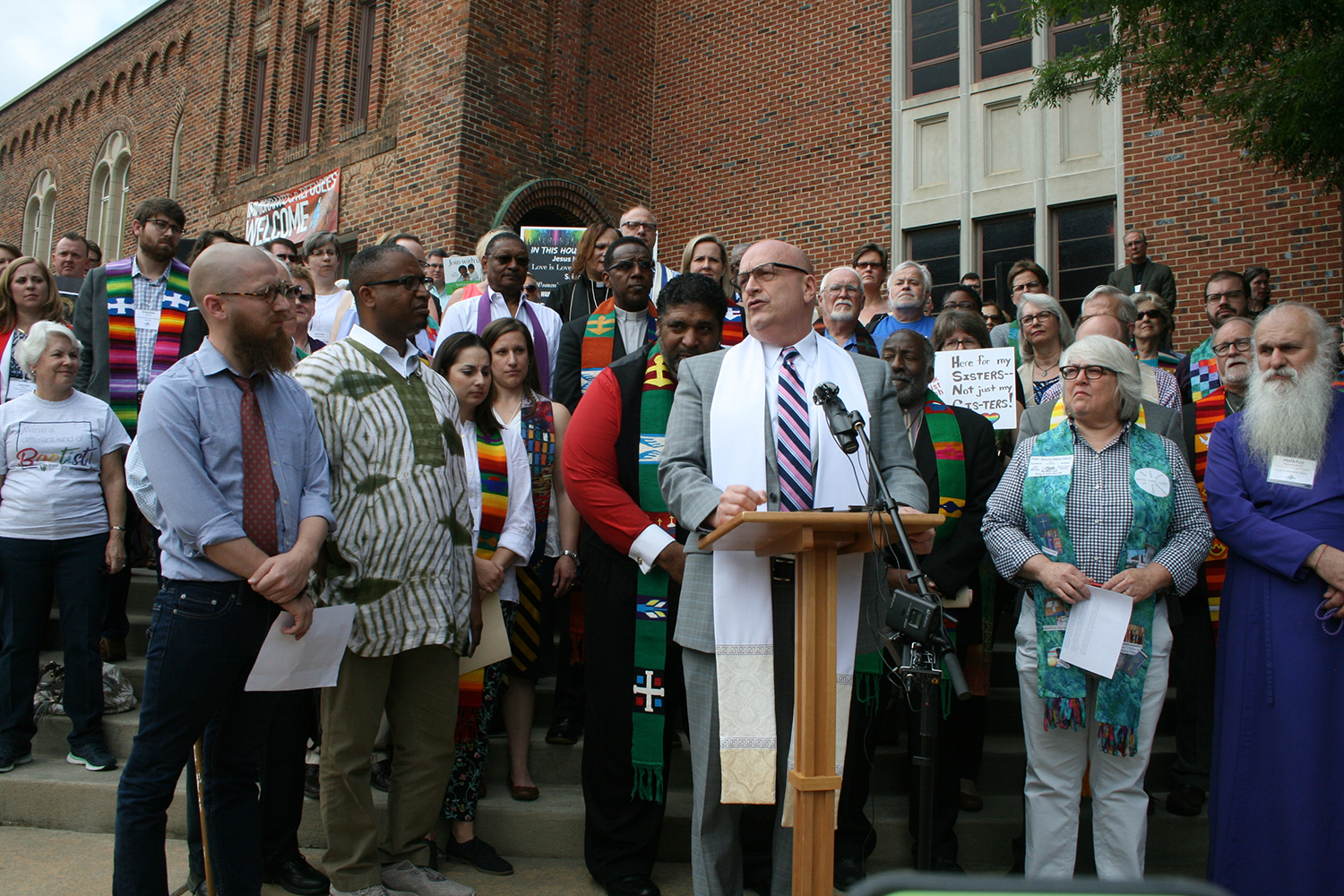Meeting in North Carolina April 27-29, members of the Alliance of Baptists called on affiliated churches to engage in “political activism grounded in a compassionate theology” in opposition to laws restricting access to public gender-segregated restrooms and other facilities based on biological sex assigned at birth.
“We stand for the inclusion of transgender persons in our churches and communities and against a lack of understanding that targets transgender persons by stereotyping,” the largest annual gathering in the progressive Baptist group’s 30-year history said in a statement adopted by consensus April 29.

Alliance of Baptists President Mike Castle, senior pastor of Harmony Creek Church in Dayton, Ohio, opens a press conference during the group’s 2017 annual gathering at Pullen Memorial Baptist Church in Raleigh, N.C. (Photo/Bob Allen/BNG)
The statement, modified from a version submitted a month ago by North Carolina ministers Russ Dean and Tim Moore, responded to the repeal and replacement of HB2, last year’s controversial measure modified recently in response to economic pressures created by corporate boycotts including the NBA and NCAA.
Last year the 133-church network founded in 1987 considered following the example of musician Bruce Springsteen’s cancellation of a concert last April in Greensboro, N.C., and relocating the 2017 Alliance gathering somewhere outside of North Carolina. Alliance directors ultimately decided to go ahead with plans to meet in Raleigh, the city where the group began three decades ago, to stand in solidarity with affiliated churches opposing the measure.
According to the National Conference of State Legislatures, North Carolina remains the only state so far to adopt a “bathroom bill,” but 16 states have considered legislation modeled after HB2 so far in the 2017 legislative session. Six states have considered legislation similar to the North Carolina replacement bill HB142, which prevents municipal and county-level laws barring discrimination based on gender identity.
The Alliance statement called on churches to educate and inform members about discrimination, to “practice hospitality and inclusion” and to “speak out on behalf of those targeted for discrimination due to their gender orientation, expression and identity.”
Alliance members said they “stand for the rights and protections of persons in the LGBTQ community and against policies that increase their exclusion and marginalization.” They support “bipartisan collaboration to address complex issues and against partisan loyalties that promote easy answers at the expense of real people” and “stand against the politics of fear that discriminates and divides: urban and rural, gay and straight, Democrat and Republican, rich and poor.”
They urged fellow Alliance Baptists to contact their elected representatives, and specifically for North Carolina lawmakers to repeal parts of HB142 and “make a good faith effort to secure the rights of LGBTQ persons in North Carolina.”
Other consensus statements approved at Saturday’s business session opposed the Trump administration’s ban on resettlement of Syrian refugees and the travel ban on immigrants from certain Muslim-majority countries and opposing efforts by Congress and state legislatures to punish entities that engage in boycotts, divestment and sanctions against Israel.
Founders of the Alliance disengaged from the Southern Baptist Convention before the nation’s second-largest faith group behind Roman Catholics changed its constitution in the early 1990s to bar from membership any churches that “act to affirm, approve, or endorse homosexual behavior.”
In 1994 Alliance directors received a report from an ad hoc Task Group on Human Sexuality encouraging churches to “welcome all persons without regard to sexual orientation or marital status into the life of the congregation” and challenging persons “whether heterosexual or same-sex oriented, to express sexual intimacy within the covenant context of a committed, monogamous relationship.”
In 2014 the Alliance received a $104,400 grant from the Arcus Foundation to support a new initiative promoting LGBT inclusion and racial justice among Baptists.
The Cooperative Baptist Fellowship, a larger and more centrist group that separated from the Southern Baptist Convention after the Alliance, does not adopt public statements on issues like homosexuality, leaving such issues up to each local church.
The 1,800-church Fellowship is, however, in the process of revisiting a 17-year-old policy against “the purposeful hiring of a staff person or the sending of a missionary who is a practicing homosexual” or expenditure of funds “for organizations or causes that condone, advocate or affirm homosexual practice” as part of a larger “Illumination Project” seeking win-win solutions to controversies that are dividing churches and society.
The Southern Baptist Convention adopted a resolution in 2014 encouraging churches to welcome transgender persons into membership“as they repent and believe,” but opposed “efforts to alter one’s bodily identity” through treatments like cross-sex hormone therapy or gender reassignment surgery, “cultural efforts to validate claims to transgender identity” and efforts by the government to validate the lifestyle “as morally praiseworthy.”
Previous stories:
‘Why Baptist?’ Group explores who they are, not who they aren’t
